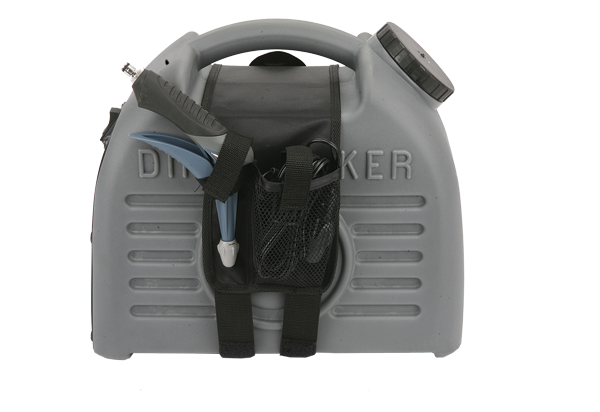Air Ace Dirt Worker Pressure Washer
 You may be wondering why we are reviewing a pressure washer. Well this is no run of the mill 240 volt washer—it’s a 12 volt unit that plugs into the cigarette lighter on your car.
You may be wondering why we are reviewing a pressure washer. Well this is no run of the mill 240 volt washer—it’s a 12 volt unit that plugs into the cigarette lighter on your car.
For years mountain bikers have been using pump-up weed sprayers to wash their bikes at events—a reasonably common sight at any muddy 12 or 24 hour. While this approach works, it’s slow and there’s a lot of hand pumping involved to keep the spray pressure up.
The Dirt Worker has a built-in 14 litre reservoir, a decent four metre 12-volt power cord and four metres of hose. All you need is your car (or a spare 12-volt battery) somewhere near your campsite and away you go. When empty the Dirt Worker only weighs 6kg, making it nice and portable (obviously it gets pretty heavy once it’s full of water though). It comes with a handy harness that’s got pockets and sleeves for all of the bits; hose, spray nozzle power lead—put everything in its place and you won’t lose anything.
Using the Dirt Worker is pretty self-explanatory. Just hook up the hose and nozzle, then plug it in. Now switch the power on and away you go. At first I was a bit disappointed by the performance. Based on its rather ‘serious’ appearance, I was expecting the cleaning power to be something like a 240-volt washer. In reality it is closer to a pump-up weed sprayer than a serious pressure washer, so don’t get your hopes up in that regard. As some indication, the Dirt Worker is claimed to produce 70psi where a domestic 240 volt pressure washer of the same price will produce around 2,000psi—now that’s a pretty big difference!

Compared to the good old garden sprayer, the Dirt Worker was a clear improvement. At maximum pressure my home weed sprayer would fill a 750ml bidon in 40-50 seconds. The Dirt Worker would do it in 30 seconds. In addition to offering a higher flow rate, the adjustable nozzle did a decent job of focussing the spray and removing dirt. Of course too much power can be a really bad thing when it comes to bike washing, as high-powered pressure washers will put water into your bearings and behind the fork seals if you aren’t careful.
Washing a mud clogged bike with the Dirt Worker takes longer than with a garden hose or a 240 volt washer but it certainly gets the job done a good deal faster than with a weed sprayer. I found it worked best if you give it a quick spray to knock off any excess dirt, then apply some bike wash and let it sit for a minute before hosing it off. This may take around 10 minutes and a full tank of water, but the results will be really good.
While you won’t be out there cleaning your driveway with the Dirt Worker, I imagine it will appeal to some mountain bikers. As mentioned it would be great for mid-event bike cleaning at 12 and 24 hour events. Beyond that, you can clean your bike at the end of a ride, before it coats the interior of your car with mud. I also found handy when staying at a hotel—do the post-ride wash you won’t track clods of dirt down the halls on the way to your room. You could even use it on the car if you were desperate…

The main problem I see with the Dirt Worker is its price. At $290 it’s certainly not cheap. Weigh up how much you’re likely to use it and make the call, but it certainly seems like a handy gadget to me.
Adventure Brands (03) 9770 8912 / www.airace.com.tw


 You may be wondering why we are reviewing a pressure washer. Well this is no run of the mill 240 volt washer—it’s a 12 volt unit that plugs into the cigarette lighter on your car.
You may be wondering why we are reviewing a pressure washer. Well this is no run of the mill 240 volt washer—it’s a 12 volt unit that plugs into the cigarette lighter on your car.

